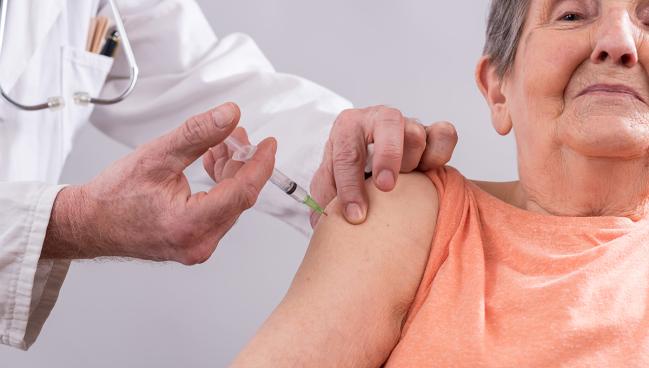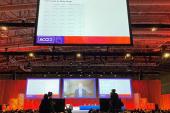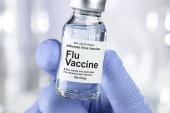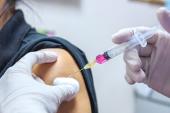Flu Vaccines Reduce MACE, Especially in ACS: Meta-analysis
Combined results from six RCTs, including IAMI, show a 34% reduction in MACE over 1 year compared with placebo.

Flu vaccines can reduce major cardiovascular events by as much as one-third compared with placebo, according to a new meta-analysis, with the largest benefit seen in those with recent ACS.
This is not the first time research has suggested cardiovascular benefit associated with flu vaccination, but the last meta-analysis, which was published in 2013, mostly included small, observational studies. More recently, the IVVE trial, presented at the American College of Cardiology 2022 Scientific Session, demonstrated a reduction in MACE only during flu season.
“The take-home message would be to really just encourage healthcare providers to counsel their patients, particularly high-risk patients, on receiving seasonal flu vaccine, and particularly speaking to them about it from this angle of cardiovascular benefit,” lead author Bahar Behrouzi, MSc (University of Toronto, Canada), told TCTMD. “Maybe this added prevention might be able to help convince people who may be on the fence about whether they are interested in getting the flu vaccine or not to get a better sense of that.”
For the study, published last week in JAMA Network Open, Behrouzi and colleagues included six randomized controlled trials—with the most recent being IAMI published in 2021—comparing the effects of influenza vaccine versus placebo among 9,001 patients (mean age 65.5 years; 42.5% women; 52.3% with a history of CV disease).
“With the addition of the most recent RCT data, we now also observe a significant interaction between the benefits of influenza vaccination for reducing cardiovascular mortality based on underlying cardiovascular risk,” the authors write. “The effect sizes reported here for major adverse cardiovascular events and cardiovascular mortality (in patients with and without recent ACS) are comparable with—if not greater than—those seen with guideline-recommended mainstays of cardiovascular therapy, such as aspirin, angiotensin-converting enzyme inhibitors, beta-blockers, statins, and dual antiplatelet therapy.”
As far as the mechanism at play, Behrouzi suspects that it is multifactorial and still under investigation. “One of them is that flu vaccine reduces your influenza illness, so that in and of itself can reduce downstream complications from getting a flu infection,” she said. “There are other basic science papers that have shown that there might be some components within the flu vaccine itself that could be anti-inflammatory . . . and may help result in that reduction of cardiovascular events as well.”
Behrouzi said she would like to see more research looking into these hypotheses both with the flu vaccine and other antiviral vaccines like those for RSV and COVID-19.
“Our hope for this research is that in highlighting these possible other benefits to being vaccinated with a viral vaccine can help create more confidence in the efficacy and the safety that's conferred by receiving the vaccines,” she said. “What it really comes down to is people are more and more interested in empowering themselves and having the right evidence, the best-produced and most-rigorous evidence to understand how vaccines work and how vaccines protect. So to be able to get a more holistic picture of how this can impact should ideally always be helpful.”
Ongoing vaccine research in general should give them a boost worldwide, “because vaccine hesitancy and confidence are also concurrent pandemics,” she added. “It would be nice to help provide more confidence in these interventions given the fact that they are relatively low cost.”
Yael L. Maxwell is Senior Medical Journalist for TCTMD and Section Editor of TCTMD's Fellows Forum. She served as the inaugural…
Read Full BioSources
Behrouzi B, Bhatt DL, Cannon CP, et al. Influenza vaccination to reduce cardiovascular risk: a meta-analysis. JAMA Network Open. 2022;5(4):e228873.
Disclosures
- Behrouzi reports receiving funding from a University of Toronto MD/PhD studentship award and the Ted Rogers Centre for Heart Research Education fund as well as institutional grant support from Boehringer Ingelheim, Lilly, and Sanofi-Aventis.





Comments